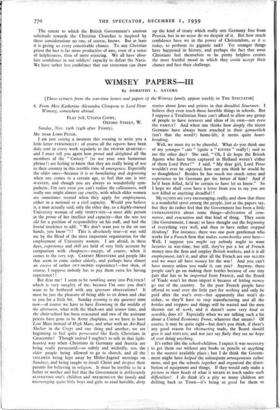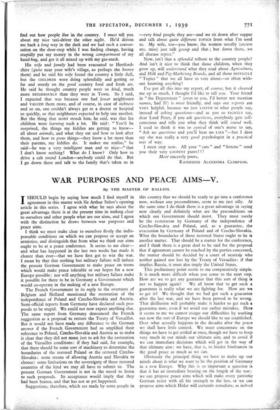WIMSEY PAPERS III
By DOROTHY L. SAYERS [These extracts from the war-time letters and papers of the Wimsey family appear weekly in THE SPECTATOR] 6. From Miss Katherine Alexandra Climpson to Lord Peter Wimsey, somewhere abroad.
FLAT 718, UTOPIA COURT, OXFORD STREET, W.
Sunday, Nov. 19th (24th after Trinity).
MY DEAR LORD PETER, I am just seizing a moment this evening to write you a little letter PERSONALLY: of course all the reports have been duly sent in every week regularly to the PROPER QUARTER— and I must tell you again how proud and delighted all the members of the " Cattery " (to use your own humorous phrase!) are feeling to know that they are really being of use to their country in this terrible time of emergency. Especially the older ones—because it is so humiliating and depressing when one comes to a certain age, to feel that one is NOT WANTED, and though you are always so wonderfully sym- pathetic, I'm sure even you can't realise the callousness, well really one might almost say cruelty, with which older women are sometimes treated when they apply for employment, either in a national or a civil capacity. Would you believe it, a man actually said, only the other day, to a highly-trained University woman of only THIRTY-SIX—a most able person in the prime of her intellect and capacity—that she was too old for a position of responsibility on his staff, and had the brutal insolence to add : " We don't want you to die on our hands, you know "! ! This is absolutely true—it was told me by the Head of the most important organisation for the employment of University women. I am afraid, in these days, experience and skill are held of very little account by comparison with cheapness—except, of course, when it comes to the very top. CABINET MINISTERS and people like that seem to come rather elderly, and perhaps have almost an excess of rather OUT-MODED experience ! —but then, of course, I suppose nobody has to pay them extra for having experience! !
But dear me! I seem to be rambling away into POLITICS! which is very naughty of me, because I'm sure you don't want to be bothered with any ignorant observations! It must be just the pleasure of being able to sit down and chat to you for a little bit. Sunday evening is my quietest time now—of course we have to have Evensong in the middle of the afternoon, what with the black-out and winter time, and the choir-school has been evacuated and two of the assistant priests have gone to be Army chaplains, so we have to have Low Mass instead of High Mass, and what with an Air-Raid ( Shelter in the Crypt and one thing and another, we are beginning to feel quite persecuted like Early Christians in Catacombs! Though indeed I oughtn't to talk in that light- hearted way when Christians in Germany and Austria are being really persecuted—so subtly and wickedly, too, the t older people being allowed to go to church, and all the CHILDREN being kept away by Hitler-Jugend meetings on . Sundays, and being taught to insult Christ and despise their parents for believing in religion. It must be terrible to be a father or mother and feel that the Government is deliberately ALIENATING one's children and BREAKING-UP the family and encouraging quite little boys and girls to read horrible, dirty stories about Jews and priests in that dreadful Stuermer. I believe they even teach those horrible things in schools. But I suppose a Totalitarian State can't afford to allow any group of people to have interests and ideas of its own—not even the FAMILY! And when one thinks how deeply the nicest Germans have always been attached to their gemuetlich (isn't that the word?) home-life, it seems quite heart- breaking.
Well, we must try to be cheerful. What do you think one of my younger " cats" (quite a " KITTEN " really!) said to me the other day? She said, " Oh, I do hope the British Agents who have been captured in Holland weren't either of them Lord Peter!" I said, "My dear girl, Lord Peter wouldn't ever be captured, how can you think he would be so thoughtless? Besides he has much too much sense and experience to let Germans get the better of him! And if he'd been killed, he'd be certain to have let us know." So I hope we shall soon have a letter from you to say you are NOT killed or anything dreadful! !
My reports are very encouraging, really, and show that there is a wonderful spirit among the people, just as the papers say, but they do rather feel that the Government has been a little UNIMAGINATIVE about some things—dislocation of com- merce, and evacuation and that kind of thing. They seem (the Government, I mean) to have thought out the beginning of everything very well, and then to have rather stopped thinking! For instance, there was one poor gentleman who works for a French firm that makes scent-bottles over here— Well, I suppose you might say nobody ought to want luxuries in war-time, but still, they've put a lot of French money into the firm and employ British workers, and it is all employment, isn't it, and after all the French are our ALLIES and we must all have money for the war! And you can't have money unless you make it, can you? Anyway, these people can't go on making their bottles because of one tiny part that has -to be imported from FRANCE, and the Board of Trade won't let them import it because of letting money go out of the country. So the poor French people have offered to send over the little part for nothing and only be paid after the war's over—but apparently that won't do either, so they'll have to stop manufacturing and all the bottles and stoppers and things will be wasted and the men thrown out of work, and it doesn't seem very kind or sensible, does it? Especially when we are talking such a lot about a United Economic Front, whatever that means? Of course, it may be quite right—but don't you think, if there's any good reason for obstructing trade, the Board should give it and EXPLAIN, and not just say flatly they see no hope of ever doing anything.
It's rather like the school-children. I expect it was necessary to get them out without any books or pencils or anything to the nearest available place ; but I do think the Govern- ment might have helped the subsequent arrangements rather more, and got the schools together and organised the distri- bution of equipment and things. If they would only make a picture in their heads of what it MEANS to teach under such difficulties! I do think it's a pity so many children are drifting back to Town—it's being so good for them to find out how people live in the country. I must tell you about my nice taxi-driver the other night. He'd driven me back a long way in the dark and we had such a conver- sation on the door-step while I was finding change, having stupidly put my money in the wrong compartment of my hand-bag, and got it all mixed up with my gas-mask.
His wife and family had been evacuated to Hertford- shire (quite near your wife's village, so perhaps she knows them) and he said his wife found the country a little dull, but the CHILDREN were doing splendidly and getting so fat and sturdy on the good country food and fresh air. He said he thought country people were so kind, much more NEIGHBOURLY than they were in Town. So I said, I expected that was because one had fewer neighbours and VALUED them more, and of course, in case of sickness and so on, one couldn't always get to a doctor or hospital so quickly, so that neighbours expected to help one another. But the thing that MOST struck him, he said, was that his children were learning such a lot. He said : " You'd be surprised, the things my kiddies are getting to know— all about animals, and what they eat and how to look after them, and how to grow things—they know a lot more than their parents, my kiddies do. It makes me realise," he said—he was a very intelligent man and so nice—" that I don't know nothing! What do I know? Only how to drive a cab round London—anybody could do that. But I go down there and talk to the family that's taken us in —very kind people they are—and we sit down after supper and talk about quite different TOPICS from what I'm used to. My wife, too—you know, the women usually (excuse me, miss) just talk gossip and that ; but down there, we all discuss topics."
Now, isn't that a splendid tribute to the country people? And isn't it nice to think that those children, when they grow up, will understand what they read about Agriculture, and Milk and Pig-Marketing Boards, and all those DIFFICULT " Topics " that we all have to vote about—so often with- out knowing anything!
I've put all this into my report, of course, but it cheered me up so much, I thought I'd like to tell you. Your friend in " the Department " (even to you, I'd better not mention names, had I?) is most friendly, and says our reports are VERY helpful, because we just LISTEN to what people say, instead of asking questions—and as you so RIGHTLY say, dear Lord Peter, if you ask questions, everybody gets self- conscious and tells you what they think will sound well. I used to think it was so cynical of one's nurse to say, " Ask no questions and you'll hear no LIES "—but I dare say she was really a very good psychologist in a practical sort of way.
I must stop now. All your " cats " and " kittens " send you their very LOUDEST purrs! ! !
Most sincerely yours,
KATHERINE ALEXANDRA CLIMPSON.













































 Previous page
Previous page